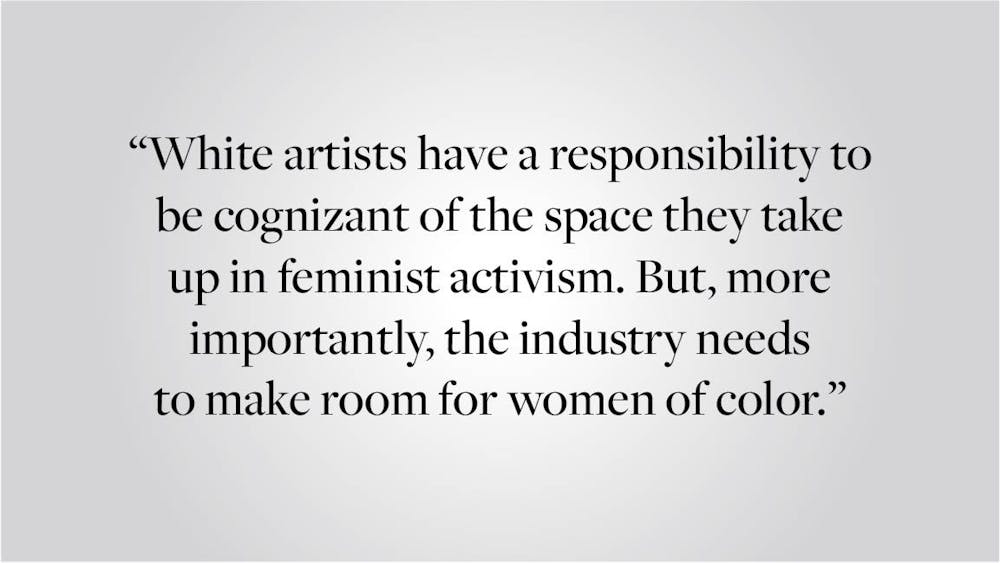Taylor Swift is a cultural phenomenon. It’s almost unfathomable in our ever-changing cultural landscape that a teenage girl who rose to stardom in the early 2000s would still be relevant as ever 15 years later. My adolescence was defined by her music, and my adulthood continues to be shaped by the sorrowful daydreaming glory of Swift’s current sound.
Swift’s career has come to be defined by resilience in the face of a misogynistic music industry wired to tear women down. Songs such as “Mean,” “Blank Space” and “Bad Blood” are angry and angsty in the way young women often are, and listening to Swift take ownership of being sort of bitchy felt incredibly validating to adolescent me. “Someday, I’ll be living in a big old city, and all you’re ever gonna be is mean,” she’d sing, and as a middle schooler with big bullies but bigger dreams, words like these resonated like no other. Just like Swift, I was a teenage girl, hormones raging and aching for stability, with no idea how to carry myself in the male-dominated world I lived in.
Swift’s lyrics and sound have matured with her, but these familiar anti-patriarchal, angry-woman themes have continued well into her later albums. But, in the midst of Swift’s cultural domination, one thing is brushed over far too often: Taylor Swift is a white woman. A painfully white woman, almost, the kind that you might expect to tell you, “I see you, I hear you, I understand,” when you recount to her a racist encounter you had. The kind that has the luxury to stay out of politics until the latter half of her career. The kind that embodies the American beauty standard. Her experiences of dealing with misogyny are valid but in no way are they universal.
While Swift’s music validated my adolescent emotions, I also envied her. She was the type of girl I wished I could be — pretty, skinny, attractive to boys and white. Swift, and other conventionally attractive white women, dominated and continue to dominate all aspects of media. For young girls of color, this is incredibly harmful. It tells us that we aren’t beautiful or valuable or wanted. Our view of what a woman should be becomes distorted, because mainstream media lacks the intersectional feminism that includes us. We are left in a weird middle ground of feminist activism — feeling empowered, but not truly included.
Take, for instance, the infamous Kanye v. Taylor feud, which started when Kanye West interrupted Swift’s speech at the Video Music Awards by insisting Beyoncé should have won. Shortly after, at a later performance, Swift sang “Innocence,” a song interpreted to be directed toward Kanye, with an image of the VMAs interruption playing in the background. In doing so, Swift situated herself as a victim bulldozed over by a man with more power. Yet, in another view, Kanye was doing more than just acting like an asshole. Through this framework, he was — bluntly perhaps — protesting an instance of racism in the music industry, and questioning why white women were so easily handed accolades when Black women were denied such recognition time and time again. Ignoring all of this, and positioning Taylor as no more than a helpless victim feeds into the problematic White-Woman-Abused-By-Black-Man trope, in which Black men are hyper-masculinized and turned into strong and threatening caricatures.
This is not to say that Swift doesn’t deserve to be angry at Kanye. But it does demonstrate how Swift holds a level of privilege women of color are never afforded. She can look at a situation like this one and ignore the role race plays, because she has never needed to be conscious of the way her race might affect the way she’s treated. From the #GirlBoss movement to Lana Del Rey’s Instagram post claiming “there has to be a place in feminism for women who look and act like me,” wealthy white women in pop culture have dominated feminist spaces for far too long. In doing so, they run the risk of implicitly furthering harmful racial stereotypes, all the while pushing whiteness as the default.
White artists have a responsibility to be cognizant of the space they take up in feminist activism. But, more importantly, the industry needs to make room for women of color. Swift is simply a symptom of a much broader industry-wide problem that privileges white women for exclusionary feminist activism, even as women of color like Cardi B, Dua Lipa and Doja Cat create success for themselves within this industry. Artists with large platforms like Swift should leverage their influence to uplift nonwhite women; music awards shows should end practices of indirect racism such as the use of the “urban” category; big name industry elites such as producers and record label owners should make a conscious effort to work with women of color.
I’m grateful for the role Taylor Swift has played in my life. She’s been there with me through the heartbreaks, the highs and the lows, the growing pains. But women of color deserve to be empowered and validated by artists who look like us. White feminism cannot continue to be the norm — not in politics, not in film and not even in the music we blast when no one’s around.
Melissa Liu ’25 can be reached at melissa_y_liu@brown.edu. Please send responses to this opinion to letters@browndailyherald.com and other op-eds to opinions@browndailyherald.com.





